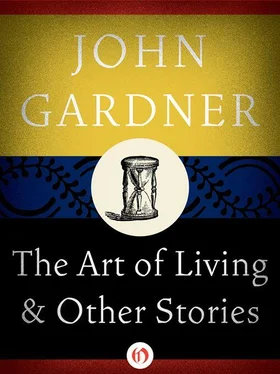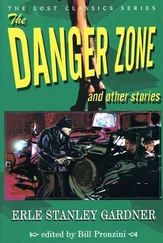John Gardner - The Art of Living - And Other Stories
Здесь есть возможность читать онлайн «John Gardner - The Art of Living - And Other Stories» весь текст электронной книги совершенно бесплатно (целиком полную версию без сокращений). В некоторых случаях можно слушать аудио, скачать через торрент в формате fb2 и присутствует краткое содержание. Год выпуска: 2010, Издательство: Open Road Media, Жанр: Современная проза, на английском языке. Описание произведения, (предисловие) а так же отзывы посетителей доступны на портале библиотеки ЛибКат.
- Название:The Art of Living: And Other Stories
- Автор:
- Издательство:Open Road Media
- Жанр:
- Год:2010
- ISBN:нет данных
- Рейтинг книги:4 / 5. Голосов: 1
-
Избранное:Добавить в избранное
- Отзывы:
-
Ваша оценка:
- 80
- 1
- 2
- 3
- 4
- 5
The Art of Living: And Other Stories: краткое содержание, описание и аннотация
Предлагаем к чтению аннотацию, описание, краткое содержание или предисловие (зависит от того, что написал сам автор книги «The Art of Living: And Other Stories»). Если вы не нашли необходимую информацию о книге — напишите в комментариях, мы постараемся отыскать её.
The Art of Living: And Other Stories — читать онлайн бесплатно полную книгу (весь текст) целиком
Ниже представлен текст книги, разбитый по страницам. Система сохранения места последней прочитанной страницы, позволяет с удобством читать онлайн бесплатно книгу «The Art of Living: And Other Stories», без необходимости каждый раз заново искать на чём Вы остановились. Поставьте закладку, и сможете в любой момент перейти на страницу, на которой закончили чтение.
Интервал:
Закладка:
One day a new horn he’d ordered from Germany, an Alexander, arrived at his office — a horn he’d gotten for a graduate student. The old man unwrapped and assembled it, the graduate student looking on — a shy young man, blond, in a limp gray sweater — and the glint in the General’s eye was like madness or at any rate lust, perhaps gluttony. When the horn was ready he went to the desk where he kept his clippings, his tools for the cleaning and repair of French horns, his cigars, photographs, and medals from the Czar, and pulled open a wide, shallow drawer. It contained perhaps a hundred mouthpieces, of all sizes and materials, from raw brass to lucite, silver, and gold, from the shallowest possible cup to the deepest. He selected one, fitted it into the horn, pressed the rim of the bell into the right side of his large belly — the horn seemed now as much a part of him as his arm or leg — clicked the shining keys to get the feel of them, then played. In that large, cork-lined room, it was as if, suddenly, a creature from some other universe had appeared, some realm where feelings become birds and dark sky, and spirit is more solid than stone. The sound was not so much loud as large, too large for a hundred French horns, it seemed. He began to play now not single notes but, to Jack’s astonishment, chords — two notes at a time, then three. He began to play runs. As if charged with life independent of the man, the horn sound fluttered and flew crazily, like an enormous trapped hawk hunting frantically for escape. It flew to the bottom of the lower register, the foundation concert F, and crashed below it, and on down and down, as if the horn in Yegudkin’s hands had no bottom, then suddenly changed its mind and flew upward in a split-second run to the horn’s top E, dropped back to the middle and then ran once more, more fiercely at the E, and this time burst through it and fluttered, manic, in the trumpet range, then lightly dropped back into its own home range and, abruptly, in the middle of a note, stopped. The room still rang, shimmered like a vision.
“Good horn,” said Yegudkin, and held the horn toward the graduate student, who sat, hands clamped on his knees, as if in a daze.
Jack Hawthorne stared at the instrument suspended in space and at his teacher’s hairy hands. Before stopping to think, he said, “You think I’ll ever play like that?”
Yegudkin laughed loudly, his black eyes widening, and it seemed that he grew larger, beatific and demonic at once, like the music; overwhelming. “Play like me? ” he exclaimed.
Jack blinked, startled by the bluntness of the thing, the terrible lack of malice, and the truth of it. His face tingled and his legs went weak, as if the life were rushing out of them. He longed to be away from there, far away, safe. Perhaps Yegudkin sensed it. He turned gruff, sending away the graduate student, then finishing up the lesson. He said nothing, today, of the stupidity of mankind. When the lesson was over he saw Jack to the door and bid him goodbye with a brief half-smile that was perhaps not for Jack at all but for the creature on the bench. “Next Saturday?” he said, as if there might be some doubt.
Jack nodded, blushing.
At the door opening on the street he began to breathe more easily, though he was weeping. He set down the horn case to brush away his tears. The sidewalk was crowded — dazed-looking Saturday-morning shoppers herding along irritably, meekly, through painfully bright light. Again he brushed tears away. He’d been late for his bus. Then the crowd opened for him and, with the horn cradled under his right arm, his music under his left, he plunged in, starting home.
STILLNESS
It would be a strange thing, Joan Orrick often thought, to have second sight, as her grandmother Frazier was supposed to have had. It occurred to her, for instance, one day when she was forty, when Martin stopped the car to wait for a light at the corner of Olive Street and Grand, in St. Louis. They were just passing through. Martin had delivered a paper at Urbana, and now they were heading for Norman, Oklahoma, where he was to serve on the jury for something called the Newstadt-Books Abroad Prize. “What is it?” she’d asked when first the invitation to Oklahoma had come. “Actually,” he’d said, and had put on his pompous look, then changed his mind, “God knows.” “Maybe we should drive through St. Louis,” she’d said. He’d agreed at once, generous and expansive as he always was when preparing a lecture he thought impressive. She’d been less impressed than she’d pretended, but that was in the past now. And when they’d left Highway 70 and nosed past the arch into the city, she wasn’t much impressed by St. Louis either. Beyond the stadium, the scrubbed, unconvincing show of government buildings, the husk of the grand old railroad station where she’d met him all those birthdays and Christmases — the years before he’d gotten his motorcycle — everything was gray, windblown, burnt out. Riding down haunted streets, brooding on the thought of second sight, she was sorry she’d come.
What would she have thought, though — sometime in the late 1940s, standing on this corner, on her way to her part-time accompanist’s job at the Duggers School of the Dance — if she’d suddenly had a vision of what downtown St. Louis would be like just twenty-five years later? What would she have thought, what would she have felt, standing on that crowded, noisy corner, if the crowd had suddenly thinned to just three or four hurrying figures and the buildings had gone solemn, like prison or mausoleum walls?
She imagined the vision coming as pure image, like a photograph or drab documentary film, with no hint of explanation — saw herself, in her 1940s schoolgirl’s clothes, pleated skirt and short-sleeved sweater, dark green coat and light green headscarf, bobbysox and loafers, her hair in a permanent, shiny and curly and a trifle stiff, books in her arm — since she came in directly from school on the bus, or on a chain of buses that shuttled her from Ferguson to Normandy to Wellston to downtown. There had been — was it on this corner? — a wonderful ice-cream place, the Park Plaza, where for a dollar you could get a parfait two feet high, and all around this section there were magnificent theaters, as colorful as circuses, with high, bold marquees on which yellow, red, blue, purple, green, and white lights (lightbulbs, she remembered, and even then the few that had burned out weren’t replaced) went racing around tall, urgent titles — Rope, The Purple Heart, The Return of Frank James —and inside, the theaters were like palaces: great gilded lions; red-velvet-covered three-inch-thick ropes on golden posts; majestic wide stairways that made everyone an instant king or queen; ushers in uniforms from the days of Empire (God knew which empire); and in the great domed theater itself a hush that was patently religious, the boom of voices from the people on the screen coming from all sides and from within, or so it seemed, oracular.
All the great stores had been downtown then, Famous-Barr, for instance, glittering, high-ceilinged, richly ceremonious inside its towering gold-framed revolving doors — the aisles choked with shoppers, most of them white, the counters and high walls revealing wonders, coats and sombre-toned stately dresses with the sleeves pinned straight out, extended for flight far overhead like hovering angels, and — everywhere — draped artificial-pearl necklaces or ruby-red or pool-ball-green or — blue or — yellow costume baubles, bracelets the color of copper in flame, and everywhere the scent of perfumes and talcums, newly printed books, the leather of new shoes, a smell as exciting and at the same time cloying as a vault of roses in one of the big downtown flowershops, or the thick, sweet incense in a Catholic church. Suppose in the twinkling of an eye, Joan thought, that whole world had vanished, and the girl on the corner, herself at fifteen, looked, stunned and afraid, at a city gone dark and empty: suppose a silence had fallen, as if all the gay sounds of the world had been abruptly turned off, like the music and static on a radio, and there came the same instant a visual stillness, as if a heart had stopped — no motion but three or four hurrying Negroes, strangely dressed, dangerous, with hair grown long and alarmingly puffed up, nothing else stirring but two pigeons overhead and a newspaper blowing along the pavement. “I’m in the future!” the imaginary Joan would finally have realized, “and there’s been some terrible war, or a plague, and everything’s been ruined.”
Читать дальшеИнтервал:
Закладка:
Похожие книги на «The Art of Living: And Other Stories»
Представляем Вашему вниманию похожие книги на «The Art of Living: And Other Stories» списком для выбора. Мы отобрали схожую по названию и смыслу литературу в надежде предоставить читателям больше вариантов отыскать новые, интересные, ещё непрочитанные произведения.
Обсуждение, отзывы о книге «The Art of Living: And Other Stories» и просто собственные мнения читателей. Оставьте ваши комментарии, напишите, что Вы думаете о произведении, его смысле или главных героях. Укажите что конкретно понравилось, а что нет, и почему Вы так считаете.












